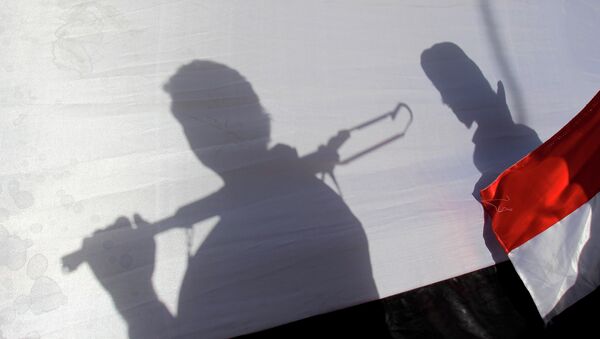The first evidence came in January this year, when a website run by Houthi-backed rebels published images of a Spanish C90 grenade launcher among rifles and other weapons that had allegedly been left behind by "Saudi mercenaries" during a battle near the Saudi-Yemeni border.
The same website published more images of C90s, purportedly made by Spanish company Instalaza, in the hands of Houthis, while in February a video was posted to social media showing Houthi militia in the Yemeni town of Midi celebrating the capture of a BMR-600 military vehicle reportedly manufactured by Spanish company Enasa.
'It's Clear Spanish Weapons Have Been Captured'
These claims were further backed up in August following the release of a report by an Australian-based arms and ammunition data organization, Armament Research Services (ARES).
The ARES report identified two Spanish-made weapons — C90-CR series rocket launchers and Alhambra series hand grenades — as being in the hands of Houthi rebels in Yemen, noting that they had more than likely been captured from Saudi forces or their allies during battle.
3-History will record all these crimes. There were 100s of ppl in the hall that has nothing to do with the conflict, it's unjustified.#Yemen
— Zaid al-Alaya'a (@zaidaahmed) October 8, 2016
"It is clear that Spanish weaponry, specifically C-90 series rocket launchers and Alhambra hand grenades, have been acquired by Houthi rebels, almost certainly by way of battlefield capture. These were likely obtained from either materiel supplied to the armed forces of Yemen by Saudi Arabia, or by direct capture from KSA forces," the report said.
Meanwhile, ARES researcher Yago Rodriguez said it was likely that more Spanish-made weapons — initially exported to Saudi Arabia in the 1990s and early 2000s — would be captured by Houthi rebel forces in the future.
UK arms sales approved quicker now than at start of Yemen war says @RednRuff and calls for UN wide embargo on arms sales to Saudi #stwconf
— London CAAT (@londoncaat) October 8, 2016
"It is reasonable to suggest that the capture of the weapons as outlined in this report likely represent only a fraction, albeit perhaps one significant for its types, of the total inventory of Spanish weaponry in Houthi rebel position. It is also reasonable, therefore, to anticipate that Yemeni forces may come into contact with more of these weapons in future."
Pressure Builds Over Arms Policy
While key Saudi allies the US and UK have been heavily criticized for their continued sale of arms to Riyadh, the alleged discovery of Spanish-made weapons also raised questions about Madrid's military sales to the Gulf kingdom, amid concerns Spain may be complicit in alleged Saudi crimes in Yemen.
An estimated 6,700 people have been killed in Yemen since the Saudi-led coalition joined the conflict in March 2015, with Riyadh accused by NGOs on numerous occasions of targeting civilian sites and residential areas.
"#Yemen's civil war shows no signs of abating & as the conflict drags on, leaders on both sides r quickly losing their legitimacy" Stratfor
— هلال الأشول lashuel (@Hlashuel) October 18, 2016
The discovery of Spanish-made weapons in Yemen has also raised questions about whether there have been breaches in Spain's arms trade policy, with the country selling US$593 million worth of military equipment to Saudi Arabia in 2015, with bombs, missiles and artillery shells among the items purchased.
The country's 2015 trade report on foreign munitions sales stated that: "All the arms licenses [for Saudi Arabia] were accompanied by final destination certificates with a strict clause prohibiting re-export or use outside home territory."
Parties to #Yemen conflict often use ceasefires to lick wounds, reposition, plan for next phase of ops. 72 hr truce likely to see the same.
— Anthony J. Tesar (@TonyTesarLB) October 18, 2016
The alleged discovery of these captured weapons in Yemen has led some to suggest that Madrid is neglecting its own rules regarding the final destination of weapons, with calls for the country to suspend arms sales to Saudi Arabia, pending an inquiry.
"The Spanish government must investigate whether the Saudi Arabia-led coalition has used Spanish arms in these airstrikes and suspend arms transfers to all sides in the conflict in Yemen which could be used to commit atrocities," said Jordi Armadans, director of the NGO FundiPau.




